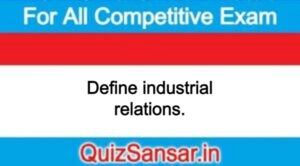
Define industrial relations.
Define industrial relations.
Or
What do you understand by industrial relation?
Ans.
Meaning and Definition of Industrial Relations
Industrial relations are as old as industry itself, though with the passage of time, the problems connected with the employer-employee relations have grown considerably in number and complexity. The term ‘industrial relations’ is used to refer to the relations between the parties concerned with industry.
Industrial relations fall under two heads, viz, personnel relations and labor relations. The term ‘personnel’ refers to individual worker while ‘labor refers to the collectivity of workers’. Developing and maintaining harmonious relations is a two way process. It depends not only on the responsiveness of labor but equally on the responsiveness of management, if the relations are not cordial the reason may be found either with the management or with the labor or with the both.
Labour-management relation is the sum total of relationship that exist at every level in the organisational structure. The relationship between the organised labour and employer is known as labor relations.
According to Encyclopaedia Britanica, “The concept of Industrial relations has been extended to denote the relations of the state with employers, workers and their organisations. The subject, therefore includes individual relations and joint consultation between employers and their organisations and trade unions and the part played by the state in regulating these relations.”
According to International Labor Organisation, “Industrial relations deals with either the relationship between the state and employers and workers organisation or the relation between the occupational organisation themselves.”
According to Prof. Dunlop, “Industrial relations may be defined as the complex of inter-relations among workers, managers and government.”
According to Dale Yoder, “The term industrial relations include recruitment, selection and training of workers, personnel management as well as collective bargaining policies and practices.”
According to Cassel Man’s Labor Dictionary, “…. The relations between employers and employees in industry in the broad sense, the term also includes the relations between the various unions; between the state and the unions as well as those between the employers and the Government.”
According to The International Labor Organisation, “Industrial relations in a wide sense denote such matters as freedom of association and the right to organise the application of the principle of the right to organise and right of collective barganining of conciliation and arbitration proceedings, and the mechinery for co-operation between the authorities and the occupational organisations at various levels of the economy.
According to Richard A. Lester, “Industrial relations involve attempts to arrive at workable solutions between the coflicting objectives and values between profit motive and social gains, between discipline and freedom, between authority and industrial democracy, between bargaining and co-operation and interests of the individual, the group and the community.”
According to Prof. T. N. Kapoor, “Industrial relations refers to a dynamic and a developing concept which is not limited to the complex relations between trade unions and management but also refers to the general web of relationships normally obtaining between employers and employees a web much more complex than the simple concept of labor capital conflict.”
According to Bethel, Smith and Others, “Industrial relations is that part of management which is concerned with the manpower of the enterprise whether machine-operator, skilled worker or manager.”
Industrial relations is very significant for our society. It consists employer-employee relations in the present situation.






